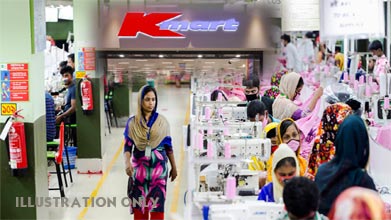Bangladeshi suppliers bullied for discounts by Aussie companies amid COVID-19 pandemic
Melbourne, May 13: Many Australian retailers have been exposed again for “unsavoury” behaviour during the COVID-19 pandemic.
Tactics of ‘asking for discounts’ and ‘pushing back orders’ with suppliers in Bangladesh and other struggling countries are being used by retailers in Australia.
Although, Kmart has reportedly taken back its demand for a 30 per cent discount from its Bangladeshi suppliers, it is still imposing very tight schedules to meet its orders.
University of Tasmania marketing lecturer Louise Grimmer talking to TND said that while Kmart withdrew its appeal for a 30 per cent discount on some already orders, after suppliers said they would not survive adhering to such a cut.
But it has kept up the pressure in another way.
“The problem is that they are now demanding suppliers still deliver existing orders (which Kmart had placed on hold during the height of the pandemic) by new deadlines,” Dr Grimmer told TND.
“Many suppliers are caught out because they can’t afford to not fill the orders, but the timelines in many cases are way too tight and can’t be met. Retailers hold all the power in the supply chain,” Dr Grimmer said talking to TND.
Dr Grimmer predicted to TND that companies who have snubbed their workers on JobKeeper awards, and brands which are being called out for poor behaviour with their suppliers; will be shunned by shoppers as consumer appetite increasingly favours ethical values.
Mosaic Brands, which owns Crossroads, Millers, Noni B has also reportedly communicated to its suppliers in Bangladesh, that the company would not meet many payments for almost eight months, according to the ABC.
Mosaic and other brands have been earlier called out for its pushy sales techniques, peddling hand sanitiser and face masks to shoppers to capitalise on the panic-buying surge.
Business Ethics experts have termed this behaviour as akin to bullying, with large multinational companies trying to cut costs where margins were already flagging.
Smaller suppliers in the third-world cannot afford to lose orders from multinationals, so they are bound to over-stretch themselves to provide discounts demanded or accept delayed payment terms.
Meanwhile, Bangladesh is already reopening its garment factories amidst concerns that workers and their families will be put to immense risk amidst COVID-19 fears.
Clothing factory workers, working in abysmal conditions in Bangladesh, are the most poorly paid – with an average of 51 cents per hour, up from just 39 cents in 2018.
Deloitte Economics last year estimated about 4 per cent of the price of a piece of clothing made in Bangladesh, sold in Australia, goes to the person who made it.
Similar Posts by The Author:
- Will the SRL & CFMEU combo become the death knell for Jacinta Allan government?
- Swati Maliwal, Sir ji’s nemesis? Is the end nigh for AAP, Kejriwal?
- Indian Spies scandal…Much Ado About Nothing
- Supriya Shrinate delivers Kangana Ranaut a huge advantage
- The Mahua Moitra saga – Is she a victim for Shashi Tharoor to save?

